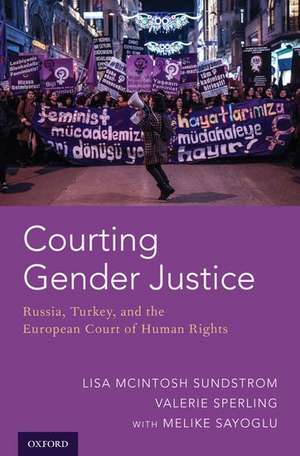Courting Gender Justice: Russia, Turkey, and the European Court of Human Rights
Autor Lisa McIntosh Sundstrom, Valerie Sperling, Melike Sayogluen Limba Engleză Hardback – 21 mar 2019
Preț: 581.30 lei
Preț vechi: 680.75 lei
-15% Nou
Puncte Express: 872
Preț estimativ în valută:
111.23€ • 116.37$ • 92.40£
111.23€ • 116.37$ • 92.40£
Carte tipărită la comandă
Livrare economică 22-28 martie
Preluare comenzi: 021 569.72.76
Specificații
ISBN-13: 9780190932831
ISBN-10: 019093283X
Pagini: 302
Dimensiuni: 157 x 239 x 31 mm
Greutate: 0.54 kg
Editura: Oxford University Press
Colecția OUP USA
Locul publicării:New York, United States
ISBN-10: 019093283X
Pagini: 302
Dimensiuni: 157 x 239 x 31 mm
Greutate: 0.54 kg
Editura: Oxford University Press
Colecția OUP USA
Locul publicării:New York, United States
Recenzii
By relying on comparative case studies of Russia and Turkey, and making good use of insightful (and on occasion alarming or heart-wrenching) interviews with lawyers, activists, academics and other human rights and feminist practitioners in Russia and Turkey, the authors succeed in presenting a compelling account of how the stark realities on the ground may hinder the effectiveness of the guarantees offered by the echr protection framework ... The key strength of this study is that it offers an accessible, clear and detailed account of activist and victims' perspectives on accessing remedies for discrimination, both in the domestic and the international legal sphere. By focusing primarily on semi-structured interviews, the authors succeed in communicating the immediacy and scale of the problem ... [I]t marks an indispensable and important addition to the literature on Article 14 echr
Courting Gender Justice is a beacon for one of the most salient legal issues of our time. Moving seamlessly between domestic and international legal and political analysis, it provides a playbook for the pitfalls and successes of utilizing courts for legal change. Case studies of litigation strategies in Turkey, Russia, and the ECtHR are a treasure trove of comparative analysis across legal domains and jurisdictions. This book is essential reading for scholars, practitioners, and activists mobilizing to eliminate gender discrimination in Europe today.
The European Court of Human Rights is often portrayed as an institution in crisis, a victim of its own success collapsing under its caseload. Refreshingly, this book tells the story of an overlooked crisis: women are struggling to find a path to the Court in order to have complaints of gender discrimination heard. The authors chart in meticulous, eye-opening detail the many obstacles that women in Russia and Turkey have to overcome in the pursuit of gender justice. It's an important read for anyone interested in women's rights and international human rights law.
Courting Gender Justice is a truly remarkable book. It is both a hopeful book that points to successful legal strategies, and a devastating account of widespread discrimination. It is one of those rare books that not only challenges your thinking, but also changes how you think about courts and legal mobilization.
An authoritative, rich, and vivid account of the challenges to fighting gender discrimination in Russian courts and in the European Court of Human Rights. The authors lay out the long and difficult trajectory that awaits gender discrimination cases as they wend their way through Russian courts and occasionally to the ECtHR- whose judges have also been reluctant to confront the issue-and make deft use of comparisons, both with Russian litigation on LGBT cases, and LGBT and gender discrimination cases from Turkey. The result is impressive indeed.
Courting Gender Justice is a beacon for one of the most salient legal issues of our time. Moving seamlessly between domestic and international legal and political analysis, it provides a playbook for the pitfalls and successes of utilizing courts for legal change. Case studies of litigation strategies in Turkey, Russia, and the ECtHR are a treasure trove of comparative analysis across legal domains and jurisdictions. This book is essential reading for scholars, practitioners, and activists mobilizing to eliminate gender discrimination in Europe today.
The European Court of Human Rights is often portrayed as an institution in crisis, a victim of its own success collapsing under its caseload. Refreshingly, this book tells the story of an overlooked crisis: women are struggling to find a path to the Court in order to have complaints of gender discrimination heard. The authors chart in meticulous, eye-opening detail the many obstacles that women in Russia and Turkey have to overcome in the pursuit of gender justice. It's an important read for anyone interested in women's rights and international human rights law.
Courting Gender Justice is a truly remarkable book. It is both a hopeful book that points to successful legal strategies, and a devastating account of widespread discrimination. It is one of those rare books that not only challenges your thinking, but also changes how you think about courts and legal mobilization.
An authoritative, rich, and vivid account of the challenges to fighting gender discrimination in Russian courts and in the European Court of Human Rights. The authors lay out the long and difficult trajectory that awaits gender discrimination cases as they wend their way through Russian courts and occasionally to the ECtHR- whose judges have also been reluctant to confront the issue-and make deft use of comparisons, both with Russian litigation on LGBT cases, and LGBT and gender discrimination cases from Turkey. The result is impressive indeed.
Notă biografică
Lisa McIntosh Sundstrom is Associate Professor of Political Science at the University of British Columbia.Valerie Sperling is Professor of Political Science at Clark University.Melike Sayoglu is a Ph.D. Candidate at Clark University.
